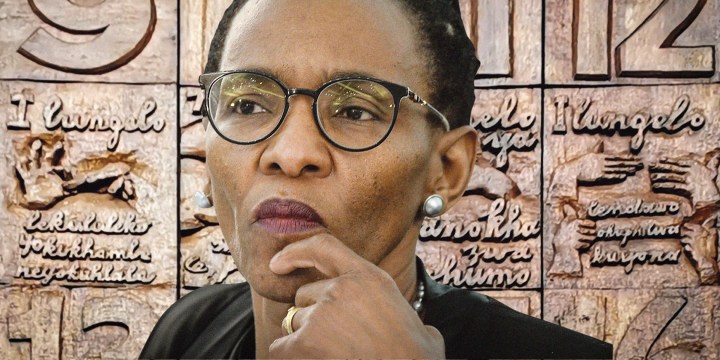JUSTICE SERVED IN 2023
From refugee rights to tax record transparency, the ConCourt had a busy year — here are some landmark rulings

The highest court champions migrants’ rights and delivers crucial decisions on election regulations for independents, tax record transparency and public participation in making legislation.
The Constitutional Court has issued 45 written judgments this year, deciding cases that affect migrant rights, voter rights and public interest access to tax records. These are some of the decisions that mattered in 2023:
Migrant rights
The ConCourt is routinely faced with cases to do with migrant rights and 2023 was no different. This month, the court ruled in the latest challenge brought by the Scalabrini Centre of Cape Town.
The case related to the validity of subsections 22 (12) and 22 (3) of the Refugees Act of 1998, which was amended in 2020 to include these provisions. They state that an asylum seeker who fails to personally renew their asylum seeker visa within one month of expiry must be regarded as having abandoned their asylum application.
The court found the sections to be unconstitutional because they violate the principle of non-refoulement, a principle of international law that prohibits a country from sending asylum seekers back to the country where they face danger or persecution.
“The impugned subsections thus create a different and distinct system in which the right of asylum seekers is not dependent on the merits of their claim to asylum, or the fate that awaits them in their country of origin, but on their ability to comply with a bureaucratic hurdle – the timeous renewal of a visa. The principle of non-refoulement is thus directly violated,” Acting Justice Ashton Schippers wrote in the unanimous judgment.
The judge also noted that the subsections infringe on asylum seekers’ right to dignity and are irrational and arbitrary. The subsections have been declared constitutionally invalid, retrospective to 1 January 2020, the date they came into effect. The Ministry of Home Affairs has been ordered to pay the Scalabrini Centre’s costs.
Earlier this year, the court made another unanimous ruling, related to the planned deportation of Beneyam Deselegn Ashebo, who had travelled to South Africa from Ethiopia. He entered the country illegally in June 2021 and claimed that his family had been killed and he was being persecuted for his religious beliefs.
He was arrested in July 2022 for being undocumented. At the time, he told authorities that he had tried to apply for asylum but had been unable to do so because the Refugee Reception Centres had been closed during the Covid-19 pandemic.
Deputy Chief Justice Mandisa Maya, writing on behalf of the court, agreed that Ashebo’s case should be decided by the ConCourt after he failed to prove urgency in the high court. She said two previous ConCourt decisions had already “unequivocally established that once an illegal foreigner has indicated their intention to apply for asylum, they must be afforded an opportunity to do so. A delay in expressing that intention is no bar to applying for refugee status…”
The court ruled: “Until an applicant’s refugee status has been finally determined, the principle of non-refoulement protects the applicant from deportation.”
Maya said Ashebo was “entitled to an opportunity to be interviewed by an immigration officer to ascertain whether there are valid reasons why he is not in possession of an asylum transit visa”.
The ruling is likely to be used as case law by other potential asylum seekers who find themselves similarly detained.
The cases have shown significant flaws in the immigration and refugee system, which the department is trying to correct with the White Paper on Citizenship, Immigration and Refugee Protection. It calls for written submissions by 19 January 2024.
Jason Brickhill, director for litigation at the Socio-Economic Rights Institute, says the cases should be studied closely by Home Affairs before any future legislative change.
Read more in Daily Maverick: After the Bell: When it comes to immigration, honestly, wir schaffen das
The ConCourt has also personally chastised Home Affairs Minister Aaron Motsoaledi and the department’s director-general for litigation in a third case involving sections of the Immigration Act, which were found to be invalid and unconstitutional.
The judgment was a result of a case brought by Home Affairs attempting to “revive” a court order that lapsed in 2019.
The original court order found that sections 34.1(b) and (d) of the Immigration Act were unconstitutional. The sections authorised the administrative detention of undocumented foreigners for the purposes of deportation.
The court took issue with the department’s conduct in the litigation and slapped Motsoaledi with a personal costs order to pay 10% of the legal fees. The director-general, Livhuwani Makhode, has been ordered to pay 25% of the legal fees and the court has ruled that the lawyer who worked on the case, Advocate Mike Bofilatos SC, should not receive a cent for work done on the application. The department said it would recover R222,862.60 paid to Bofilatos.
Public interest ruling
In May, the ConCourt ruled that sections of the Promotion to Access of Information Act (Paia) and the Tax Administration Act, which completely disallow access to a third party’s tax records, are invalid. The court ruled that the law should allow for tax records to be accessed in limited circumstances and in the public interest.
The case was a result of a request by the Financial Mail and the amaBhungane Centre for Investigative Journalism for access to former president Jacob Zuma’s tax records.
The decision means that both pieces of legislation must be amended to allow for access to tax records in the public interest.
In a majority judgment penned and delivered by Justice Jody Kollapen, the court agreed that Sections 35 and 36 of Paia and sections 67 and 69 of the Tax Administration Act conflict with section 32 of the Constitution, which says that “everyone has the right of access to: (a) any information held by the state; and (b) any information that is held by another person and that is required for the exercise or protection of any rights”.
Read more in Daily Maverick: The curious history of litigating for access to Zuma’s tax records
The court made it clear that the ruling did not amount to open access to all tax records but would allow applications for access to be made in the public interest. The SA Revenue Service would still make the final decision, but would need to use public interest as the barometer.
Elections
The court also had to decide how the 2024 elections would unfold, with the number of signatures required for independent candidates to enter the race being in question. The court ruled that independent candidates need 1,000 signatures, but the Independent Candidates Association failed to get the provision on seat allocations overturned. The decision resolved the main issues that would have affected the Electoral Commission of SA’s ability to organise the election.
Public participation ruling
The court also made significant rulings related to Parliament and the former Public Protector. In May, it delivered a judgment in a case brought by Constance Mogale and the Land Access Movement against the Speaker of Parliament, the National Assembly and all nine provincial legislatures. The court found that Parliament had failed in its responsibility to ensure adequate public participation when holding public hearings for the Traditional and Khoi-San Leadership Act of 2019. The Act was declared invalid and Parliament was given 24 months to rectify the issue.
In July, the court made a significant ruling on the validity of the suspension of former Public Protector Busisiwe Mkhwebane.
Brickhill noted that the court had had a busy year, dealing not only with rights but also deciding on private law matters.
“The … balance is shifting more away from constitutional matters and human rights issues towards matters that concern private law and private actors. There are now on average about 50 judgments a year. A large portion are for corporate litigants, either against other corporate actors or against the state exercising regulatory powers,” he said.
This change is partly owing to the court’s expanded jurisdiction. It has become the apex court on all matters, not just constitutional issues. Brickhill added that the limited availability of pro bono legal assistance also played a role in this shifting dynamic.
“It is so much easier for large corporates to access the courts than poor communities. I think that is something that we should take notice [of] and be concerned about.” DM
This story first appeared in our weekly Daily Maverick 168 newspaper, which is available countrywide for R29.




















 Become an Insider
Become an Insider
No mention that it is woefully behind in delivering judgements? The Groundup site shows at least 20 outstanding/reserved judgements – a few longer than 6 months and several more than 3 months outstanding.
Is it slowly sinking under the new workload?